There’s a lot of memes online about how every time you find a recipe online, you have to scroll through lots and lots of unrelated bullshit about the blogger’s life story and everything they did that day before cooking this meal. Or perhaps it’s the touching story of how this recipe has been in the family for generations or a story about how they met the person who first introduced them to the recipe. This story can be really, really dragged out if they’ve learnt it from their grandparents or someone they’ve known their whole life because now you need to know their whole life story about everything they’ve done with that person leading up to the unveiling of the recipe.
That might sound like an exaggeration, but it’s very commonplace but why? Well, if you found this article in Google or another search engine, I guess you already know that the whole blogger’s life story before the recipe is a common thing.
Well first, let’s look at some of the memes about recipes always including a long life story before we get too far to show that this whole thing is becoming a joke to a lot of people.
Cooking Recipe Story Memes
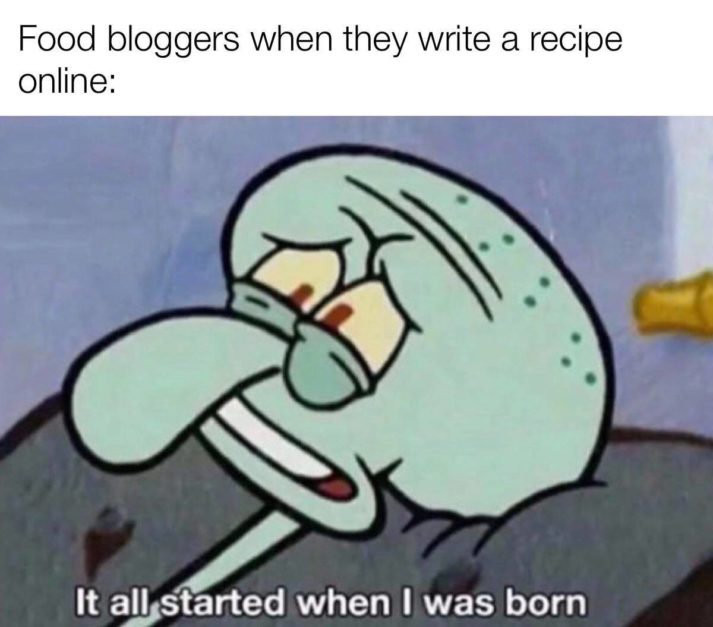
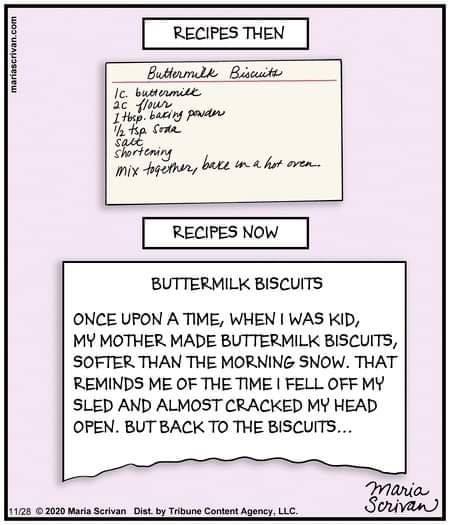
Credit: Maria Scrivan.
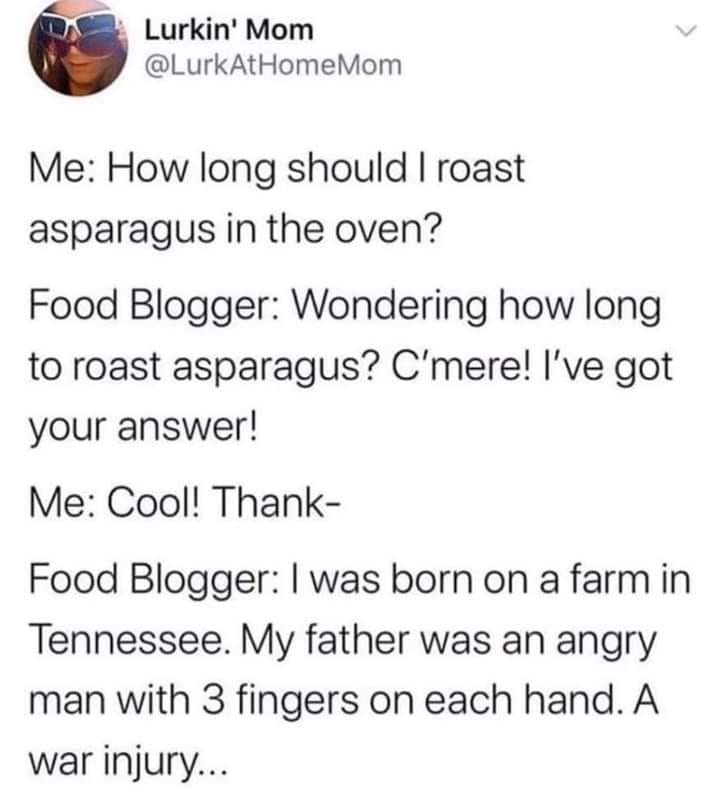
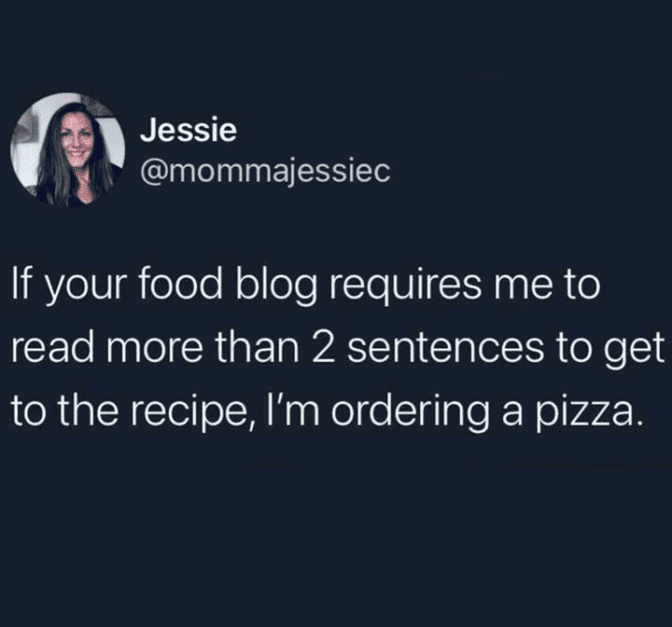
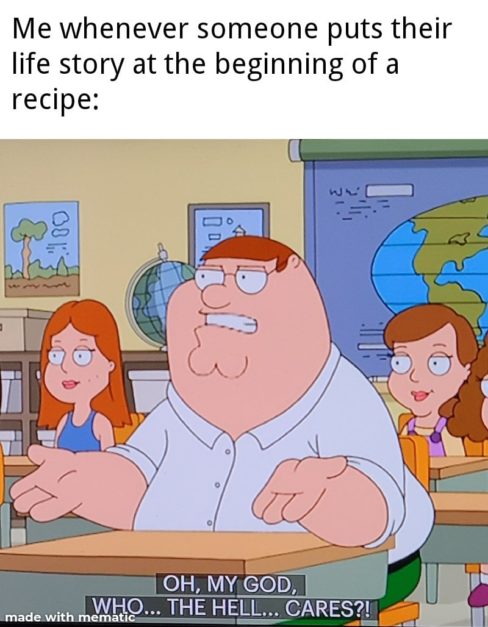
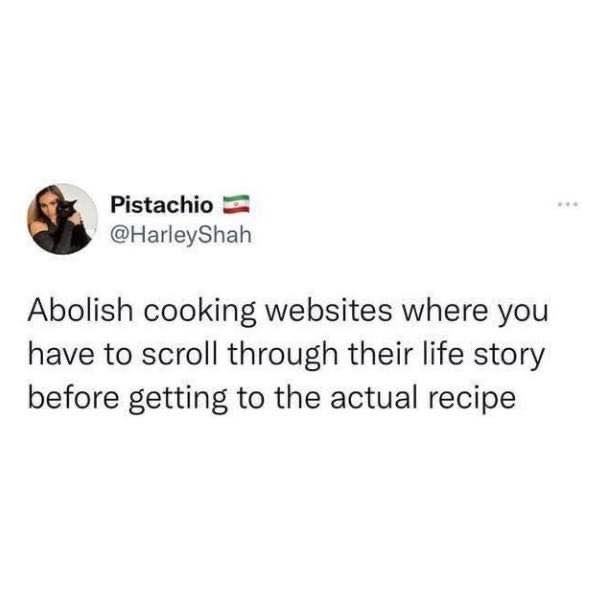
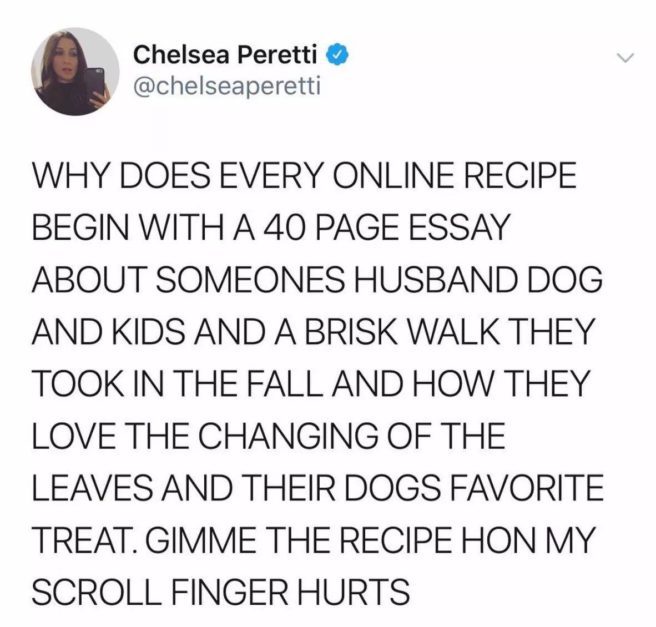
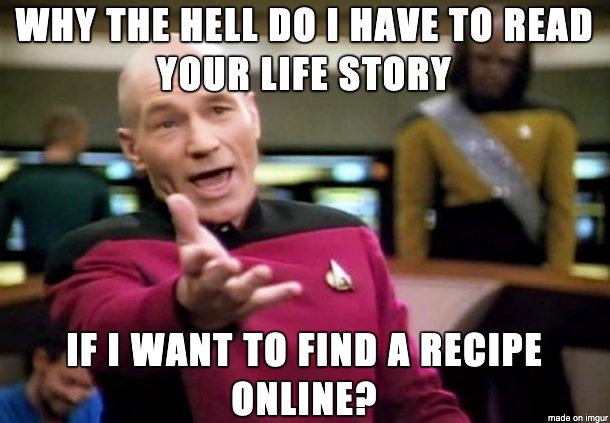

Why Are These Online Recipes So Annoying?
People are clearly passionate about the inconvenience caused here. Depending on whether you’re on a computer or a mobile device, scrolling can be a much slower experience. On a desktop, the text is a lot wider, so you don’t have to scroll as far to get past it all. But on mobile devices, you are scrolling forever. I imagine that far more people are checking these recipes either at the supermarket where they just want to double-check the ingredient list and need to scroll down to check something. No one wants to spend more time in the supermarket than they need to. Or they are in the kitchen on their mobile and no one wants to need to scroll for an hour on their phone or tablet to check something when they’ve got something on a frying pan or when your hands are covered in raw chicken juice. It’s just really inconvenient. Very fair complaints from a user experience point of view. But why do they always do this?
The Reason Food Bloggers Tell Long Stories
The reason is SEO, something I do for a job and I have been doing it since 2009, and I’m super tempted to tell you all about how I started out in this industry and how it’s changed over the years and stuff like that but if I did, I’d be as annoying as the bloggers that we are both annoyed at. But then again, I already made you scroll this far through all those dank memes so I guess I’ll just cut to the chase.
Duplicate Content Issues for Recipes Online
When it comes to recipes, especially really good recipes, there can only be so many genuinely good versions of the recipe right? Like, how many ways could you possibly fry an egg? Well, Google likes to promote unique content as well as authoritative content. Google is all about the user experience and establishing itself as the best search engine in the world.
Imagine if you Googled something and clicked into the first result and it wasn’t what you wanted. Next, you click back to the search results and you click the next result and it’s basically the same thing. Dang, how annoying. Now you click back into the search results and try the third result, it’s basically the same. How annoying. What a bad user experience. Screw this engine, I’m going to take my life into my own hands and try Bing!
So basically, Google doesn’t like ranking multiple versions of what is effectively the same thing. This would make people lose confidence in their algorithm and people searching via Google is their business model. Yes, they make most of their money via Google Ads and their AdSense display banners on websites, but having the best organic experience is what brings people to their platform. It is very important to them that people find what they actually want as fast as possible and showing people the same irrelevant content over and over again will only encourage people to leave the platform and try out a competitor to Google such as DuckDuckGo or Bing instead.
So Why is There a Long Life Story About Everything That Led up to Them Finding This Recipe?
Well, apart from the duplicated recipe that doesn’t have a whole lot of wiggle-room in the creativity, simply posting the list of ingredients and the steps would be too short to give Google enough context on what the page is about. In many cases where the search phrase is competitive, a longer post can often rank better. Now, I am not suggesting you add a bunch of random junk to the article to pad it out with irrelevant junk. You will find that the content is often strewn with vague references to the recipe title, this helps build up the relevance on the topic to Google, suggesting that this is the article that is more relevant than others. The length of the story helps give the illusion of depth and expertise on the said subject matter.
But Why Not Just Keep the Recipe at the Start of the Article and Put the Life Story at the End?
Well, I guess that brings you to my next and final point about this whole topic. I probably could have summarised this with a few sentences to explain it, but you or the person who shared this with you would have never found it if I wrote such a short, thin article that couldn’t be found on Google. That is a trick to manipulating Google’s algorithm that the whole online recipe industry has figured out long ago and are doing a great job with to this day.
Yes, getting links from other websites is massively important for SEO, that’s super important. But a lot of the recipes who did this on-page SEO work early on have probably acquired a crazy amount of organic backlinks from being early adopters of these tactics.
For newer publishers, doing what you can to rank well in this competitive industry is important. For a lot of bloggers, a portion of their revenue comes from Google Adsense and other display ad providers. By making you scroll a mile through the other stuff to get to what you wanted to see, you are probably passing a few banner ads which you might be tempted to click on or that the author is at least earning money on from you having seen it. You would have seen a few on this website already.
These ads help pay the bills for these bloggers. Nothing is really free on the internet. If you want to see recipes where the author gets straight to the point, such websites exist, but you’ll either need to pay for a subscription or find the article by using the internal search of the website, which requires you to first get to their home page somehow which is different search behaviour.
By making you scroll to find the information you’re looking for, it also helps other vanity metrics such as increasing the average time on the page and on the website. There are various reasons why bloggers want to keep you on the site as long as possible.
Conclusion
So whilst it could be argued that food bloggers are trying to connect with their readers and showcase their personalities or tastes, that’s only a small part of it. It’s really just about doing what will help get them the most traffic and revenue.





